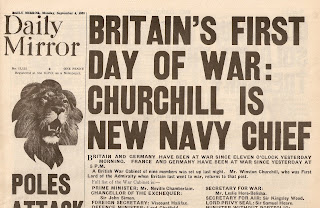It was a day like any other Sunday. A cloudless late summer
day. The sound of lawns being mowed. The smell of cooking drifting out of the
kitchen. People in their finery attending church. Couples getting ready for
afternoon wedding ceremonies.
It was a day unlike any other. A day of apprehension as
families settled round the wireless set to listen to the expected announcement.
The announcement of the outbreak of the second world war. Almost immediately
after, in parts of the country, air-raid sirens sent folk scurrying off to the
Anderson shelters. People looked east expecting German bombers to fill the
skies at any minute. A young lad is sent off to buy 400 fags for fear they be
put on ration. Gas masks and blackout material were brought out. Meanwhile for
the rest of the day the radio broadcasts were filled with extra news bulletins
and endless official announcements about the closure of theatres and cinemas,
air raid sirens and the mass evacuation of children.
That day, Sunday 3 September 1939, is recalled in this 50th
anniversary broadcast called The Day War
Broke Out. Former war correspondent Frank Gillard sets the scene for Prime
Minister Neville Chamberlain's fateful announcement that "this country is
at war with Germany", replayed in full. And then we hear from those that
lived through that day, their memories and feelings as to what the war would
bring.
The Day War Broke Out was
broadcast on BBC Radio 4 on Sunday 3 September 1989 and was produced by Peter
Griffiths. This is an edited version.
For the BBC war preparations, months in the planning, had
come into effect on Friday the 1st when the orders went out to all the studios
and transmitter sites. By six o'clock that evening announcer Robert MacDermott
was playing records and telling listeners to tune in to either 391 or 449
metres, the wavelengths of the Scottish and North regions and at 8.15 pm it was
announced, for the very first time "This is the BBC Home Service." Additional
daytime news bulletins were introduced, breaching the long-standing agreement
with newspaper proprietors not to broadcast any news before 6 pm for fear of
affecting sales of the evening papers. Any major announcements made overnight
would be preceded by a 5-minute Bow Bells interval signal.
On the morning of Sunday the 3rd announcer Alvar Lidell was
on duty at 10 o'clock to prepare the country for Chamberlain's announcement: "Following the midnight meeting of the Cabinet, the
British ambassador at 9 a.m. this morning gave the German government two further
hours in which to decide whether they would at once withdraw their troops from
Poland. This ultimatum expires at 11 a.m. The Prime Minister will broadcast to
the nation at 11.15 a.m."
 |
| Home Service programmes for Monday 4 September 1939 as listed in the Daily Telegraph with little offered beyond news, announcements, records and Sandy MacPherson |
It was Lidell who was introduced Neville Chamberlain's broadcast
from the Cabinet Room at 10 Downing Street and was the only other person with
him in the room whilst he made it. Hourly bulletins followed throughout the day
read by Stuart Hibberd and Lionel Marson with the King speaking at 6 p.m. All
this was interspersed with intervals of gramophone records, Sandy MacPherson at
the console of the BBC Theatre Organ and, one scheduled programme which did
make it to air, the first instalment of a reading of J.B. Priestley's new novel
Let the People Sing.
The Home Service closed down for the night at 12.15 a.m. The
day war broke out was over.
Read and hear more about the early days of World War II on the BBC's archive pages.

No comments:
Post a Comment